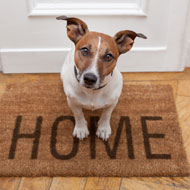The lost owner epidemic

Out-of-date information on microchips remains an issue, making it very difficult to reunite pets with their owners.
Two in five vets say they are unable to reunite missing pets with their owners due to incorrect information on the microchip database, according to new figures from the BVA.
The National Veterinary Data Service, which exhibited at last week’s BSAVA Congress (6-9 April), is working to address this issue by providing an advanced reunification service. The NVD database is synchronised with registered practice management systems, meaning clients do not need to update their personal information with both the practice and the database.
It has been a year since dog microchipping became compulsory in England, Wales and Scotland, and estimates suggest the majority of dogs are now microchipped. BVA’s latest Voice of the Veterinary Profession survey found seven in 10 vets believe the majority of dogs they see in practice have been chipped. However, out-of-date information on the microchip remains an issue, making it very difficult to reunite pets with their owners.
Moving house or bringing a new dog into the home are risky times; dogs feel disorientated and microchip details are most likely to be incorrect during these times. BVA stressed the importance of owners updating information as soon as they bring a new dog home or move to a new address, but this is something that is often forgotten.
Speaking to delegates at this year’s BSAVA Congress, NVD staff explained that the database was set up specifically to overcome these issues.
All microchip information is processed and kept up to date through the pet owner’s veterinary practice; if the client moves home or changes phone number, all they need to do is inform their registered veterinary practice. The information updates on the PMS, which automatically synchronises and updates the NVD database.
As a result, NVD-registered practices are able to reassure their clients that should their pets go missing, the most up-to-date contact information will be available.
For more information visit: nvds.co.uk



 The Animal and Plant Health Agency (APHA) has updated its online reporting service for dead wild birds.
The Animal and Plant Health Agency (APHA) has updated its online reporting service for dead wild birds.